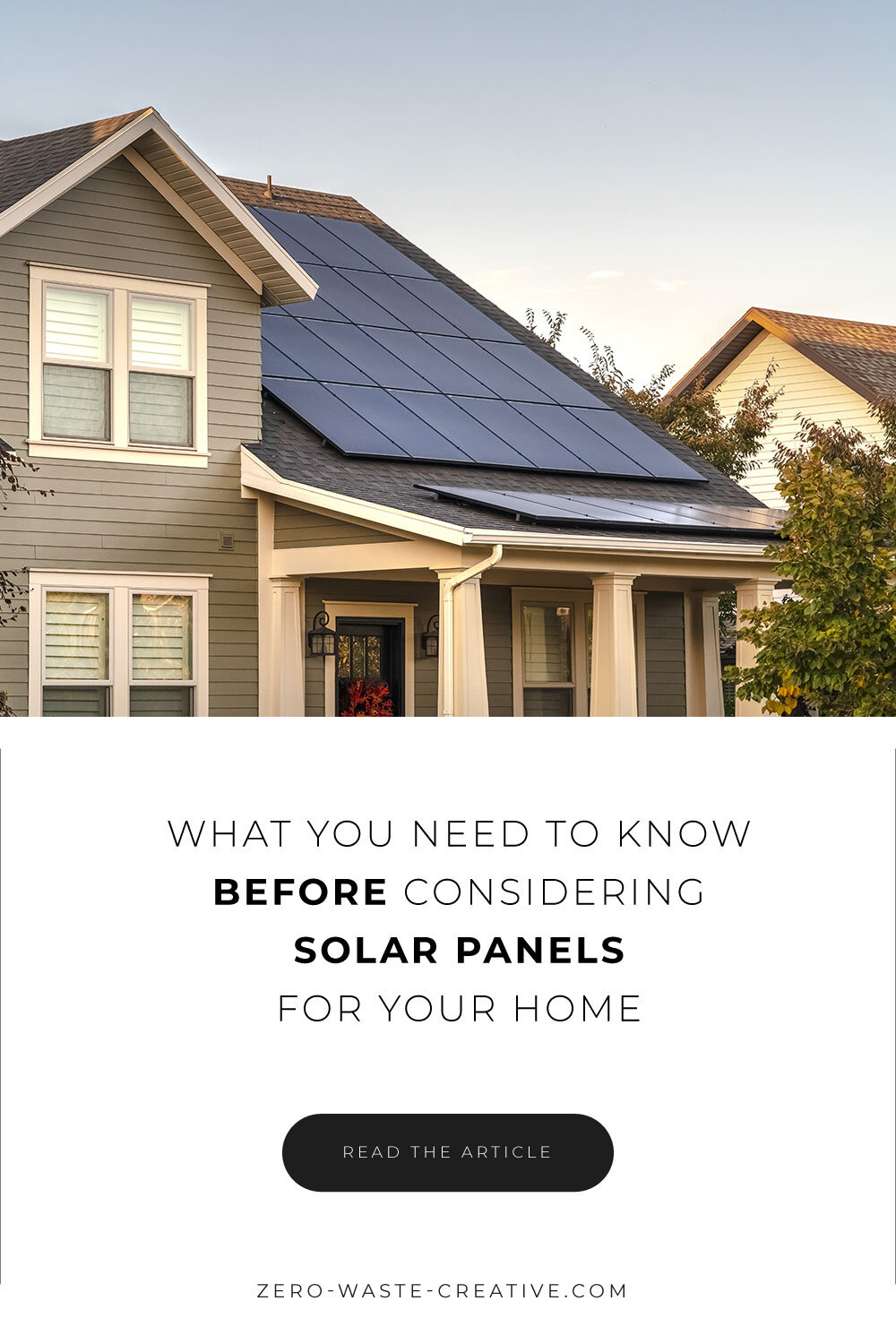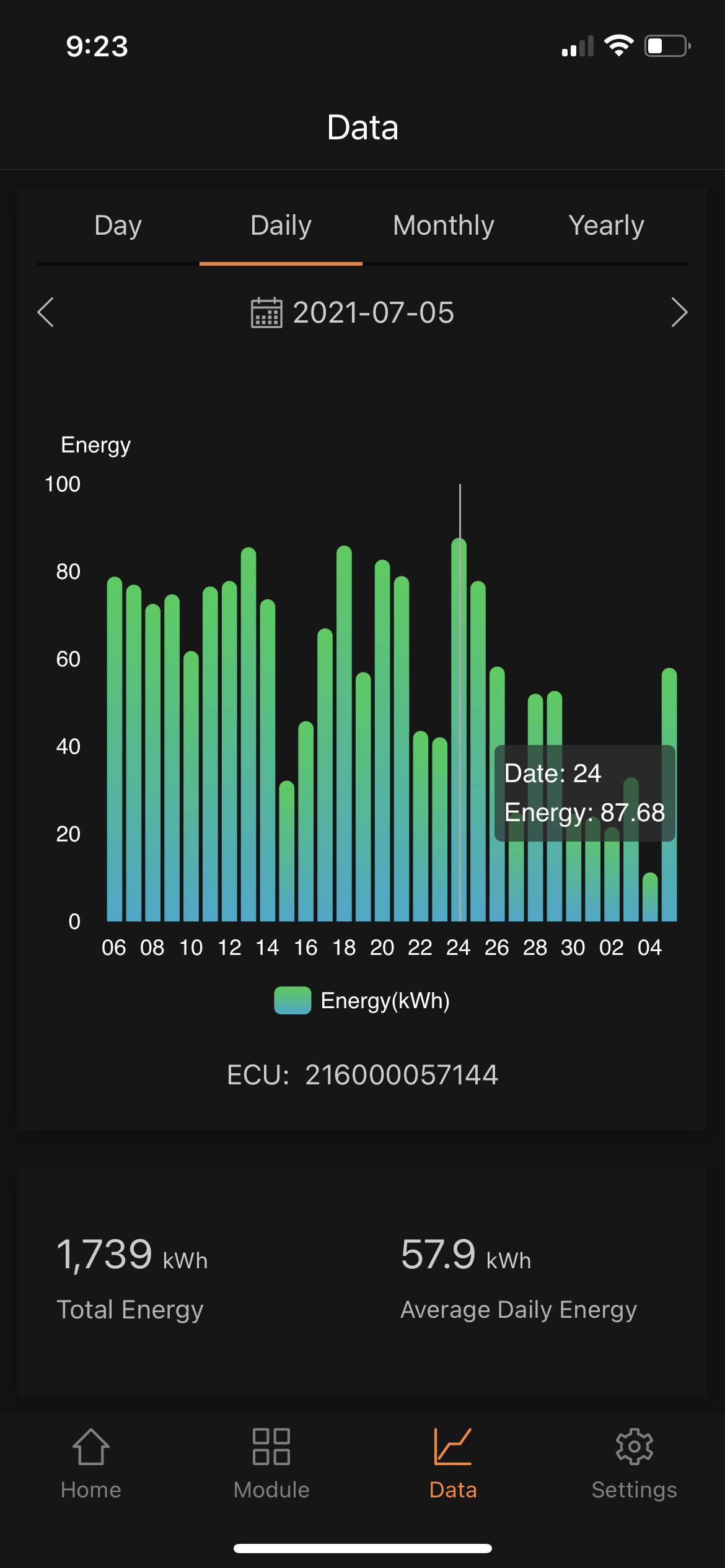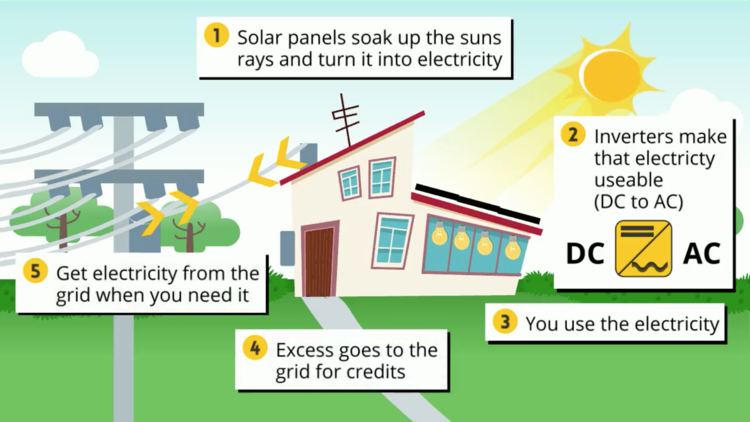What you Need to Know Before Considering Solar Panels for your Home
It has been a few months since we started thinking about adding solar panels to our home.
I put together this blog article to answer the list of questions my husband and I put together while determining whether or not solar panels were the right choice for us and our home. I asked my friend and neighbour Neil about his experience with solar panels and he seems to be really happy with his decision. I also asked Chris Landy about their solar panels, which were added in February this year.
I contacted Sunly and Renewable Lifestyles here in PEI for quotes and to ask them a few questions. Both companies were quick to reply and happy to help to answer any of my questions, which has been great!
I hope the information I have learned can be useful to you too if you are interested in learning more.
We continue to learn more about solar panels and educate ourselves for when the time comes. If you are also interested in this green technology and currently doing research, you have come to the right place! Mark and I have read tons of articles online, requested quotes from two different local companies, and reached out to hear from people who actually have invested in solar panels.
To give you some context, we live in Prince Edward Island, Canada (Maritimes Canada) and the winters here can be brutal. We needed to take our four seasons and long winter days into serious consideration. It’s not like we have full sun year-round, and we were curious if the yearly snowfall would impact the effectiveness and overall value of the investment.
Overall I am a big fan of renewable energy and solar panels, but there are a few things that made us stop and think. For such a large investment, there are inevitable questions that need to be answered. We wondered what happens with the solar panels after they are not usable anymore? Do they end up in the landfill? What happens if we live in a cold climate with a long winter and a small number of sunny days?
Neil had this to say about the matter:
Getting solar panels has been a long-term goal to move away from using fossil fuels as an energy source. Within the last few years, the cost of solar panels has dropped significantly, making it both a green and cost-effective choice!
I think it is a great idea but my husband is more risk-averse and thinks we should wait a little bit longer. When we had a final discussion about adding solar panels to our home we decided it is not the right time for us just yet. We are definitely planning to add solar panels in the next few years, but just not at this time.
First off, these are my key takeaways from my questions on investing in solar panels:
Solar panels are still a growing technology and industry and there are still lots of unanswered questions
Solar panels are a great way to produce renewable energy
Roofs are considered a barrier to adding solar panels
There are more and more incentives available to offset the cost
Everybody we talked to LOVE their solar panels. I chatted with two families who had their solar panels for almost a year. Their feedback was positive only.
“ We are extremely happy with our solar panels! They make sunny days even better. We now use electricity for heating the entire house and no longer use oil for heat. Our monthly bill was about $200/month prior. Since we had our solar panels installed, that has dropped to an average cost of $80/month.”
Although our two friends loved their solar panels and made us want some for our home, we just couldn’t just yet. Here are three reasons why we decided not to add solar panels to our home in 2021:
We first need to replace our roof before installing panels
We already have financial goals and want to first and foremost pay off our mortgage
We want to save up the money to pay upfront instead of needing a loan or incurring debt
We are really keen on adding solar panels to our roof but unfortunately, we will have to wait a little bit. We looked into getting some panels for the ground but we didn’t really have the space for them as they are really big systems. The smallest table we can build is 30 feet across and it needs about 30 feet of clearance in all directions. With the large trees on our property, the system would also be too low to the ground to be very efficient.
Keep in mind that our lifestyle and way of living is a big factor in influencing our decision. We could have applied for a loan, immediately redo our roof and add in the solar panels all at the same time, but we want to be out of debt and save money for the projects first. If you are interested in our debt journey, you can check it out in a blog post I wrote here.
OK, now that I have explained that it’s time to get into the Q&A portion of this article.
Do solar panels require a lot of paperwork?
You will be happy to learn that you don't have to do very much when it comes to paperwork. All you need is your latest electrical bill, photo ID, property papers. The companies you hire already have a streamlined process that will take away the headaches of doing paperwork. The solar companies we spoke with provided us with some options for direct payment plans with them as well. Depending on your financial situation, you might be able to avoid a loan this way. You also don’t need to worry about applying for the building permit, the company will take care of it for you.
How much energy do solar panels generate in a month?
Chris Landy send me an image that perfectly illustrates how much energy the panels generate every month. He got his solar panels in February 2021.
How long does it take to add roof solar panels?
On average it takes 4 months to get the process going and have all the systems on your roof running from start to finish. Depending on the company you choose to go with and your payment plan, this could vary. I would definitely recommend pursuing a local quote from nearby companies if possible. Our experience was really positive and we had a LOT of our questions answered about solar panels in general, but also ones that pertained to our specific property.
What is the process of getting solar:
Get a quote for free
Get an engineering assessment
Check the structure, solar layout and electrical
Apply for rebates and building permits
Sign contract with Maritime Electric
Installation with periodic check-ups
Final inspection with system testing and verification
Set up the app and the system connection
Monitor for 24 hours
What are the Hidden Costs of Solar Panels?
Building permit cost
Electricity provider fees
Rental fee
Insurance
Sales tax
Like basically any other major home project, there are a number of hidden costs to consider.
Firstly, you will need to cover the building permit cost (around 230 CAD here).
There is also a mandatory fee for being a Maritime Electric Customer, so there is potentially other electricity provider fees to consider specific to your area.
The rental fee for panels if you go with the 0% financing for 12 years: this fee depends on your electrical bill. You will have to let your insurance know that you are adding solar panels.
We looked into it and learned we would be paying around an extra 50 CAD with our yearly home insurance for the solar panels.
Lastly, there is the sales tax for credits to consider for you to send to your electric provider when you buy them back.
In what ways can you pay for solar panels?
Upfront
A loan from a financial institution
Financing through a government program
A monthly plan with low to 0% interest directly through the company
“We financed 100% of it through the company. The total cost was about $36,000, but then we got a $10,000 grant from the province. SO we financed $26,000. Payment is $175 approx/month.”
What are the incentives for putting solar panels on your property in PEI?
There are currently two government incentives you can take advantage of on Prince Edward Island. There is a provincial program from Efficiency PEI and a federal program through the Canada Greener Homes grant.
Provincial Incentive: Solar Electric Rebate Program from Efficiency PEI
The Efficiency PEI’s solar incentive provides a rebate of up to 40 percent of the cost of installing solar panels – up to $10,000 for homes. They also have an option available specific to farms and business land. There is a number of eligibility factors to consider when looking into this grant. For example, a residential property can be no more than three stories high, and the home must have a permanent electrical utility connection.
Federal Incentive: Canada Greener Homes Grant
This grant offers up to $600 for the cost of pre-and post-retrofit EnerGuide evaluation and up to $5000 total for the implementation of eligible retrofits. You can get up to 5600 dollars to make your home more sustainable. I already applied and I am waiting for an energy advisor to contact me and come over to evaluate our home.
Are solar panels worth it through Canadian winters?
Everyone I talked to seems to be happy with the amount of energy the solar panels produced during the summer months and how it balanced out the winter months. Your solar panels will most likely produce more energy than needed during the summer months, which will transform into credits you can use during the winter months. Sunly has this image to show how it works:
Source: https://sunly.ca/blog/net-meter-and-chill
What happens if your solar panels make more energy than your bill?
When your solar panels make more energy than you need, they convert to credits in your Maritime Electric account which you can use later towards your winter bills. However, when you receive back those credits from Maritime Electric, you also have to pay HST,w which is not exactly fair as you are not actually buying that energy, you just take back the energy you produced. You can also claim the HST if you register as business.
Can you install solar panels on any roof?
In general, you need a roof that lasts as long as your solar panels, which is 20-25 years. Metal roofs are great because they last up to 50 years, but you have to take into consideration that there are metal roofs that do not work with solar panels. On average, there is a 30-40 years warranty for a metal roof, whereas you can only rely on 20-30 years for the regular roofs.
Do solar panels need to be cleaned?
Salespeople will tell you that your solar panels will not need any cleaning or maintenance but if you read more about it, you will see that they do in fact need some maintenance. This is different depending on your location, the weather conditions, and other environmental factors. After almost a year of using the solar panels, Neil says that they didn’t need any maintenance:
We’ve had the solar panels installed for just over a year now and there is absolutely no maintenance required. Even through Canadian winters, they don’t need to be cleared as the snow melts off on its own
In my own research, I have found that this process to not be easy. Cleaning solar panels is not an easy job so I would not recommend taking this on yourself. This is one of those tasks that you have to leave to professionals.
“We do not expect you to clean the panels or remove snow, in fact snow coverage is calculated into the production. If they happen to get excessively dirty for some reason, you could spray them with a hose, however the rain should take care of them 99% of the time.”
How much do solar panels cost for a home?
There is no way to get an average price for a house. Where you live, weather conditions and the amount of energy you need are all factors in determining the number of panels you will need for your home. The best way to find out many solar panels would cost for your home is to get a quote from local solar panel companies. They are usually free and will give you more information on the costs you will be incurred for this investment.
There is a formula to calculate how much solar panels cost and the whole formula is beautifully explained in an article about solar panels on the Nova Scotia Government page here.
“We financed 100% of it through the company. The total cost was about $36,000, but then we got a $10,000 grant from the province. SO we financed $26,000. Payment is $175 approx./month.
Our monthly bill would have been no less than $220/month. We now pay $33 for the connection fee plus the loan of $175.”
How long does it take to generate an ROI for solar panels?
For most solar panel buyers, you can expect to see a return on investment within eight years. This can be calculated by taking the initial costs, and the panels’ estimated electricity generation and comparing it to how much electricity your home will be using versus the amount of energy you can receive rebates for.
Will solar panels work on any home/house/apartment?
Solar panels work for any buildings that are facing south, east or west. South orientation will offer the most power, while east and west offer moderate power. A house orientated north will not produce enough energy for it to be worth it.
What can cause your solar panels to degrade?
There are a number of things that can impact the lifespan of your panels. It is inevitable that they will degrade over the course of their lifecycle but there are some specific contributors that can prevent them from working efficiently and overall shorten their lifespan. These include dust, salt, bird droppings, and extended extreme weather conditions such as humidity, snow, and ice.
How do you know that your solar panels are not working properly?
Tracking the energy your panels produce would be the easiest way to determine whether or not your panels are working properly.
Neil added:
There is an app that displays the energy production of each individual solar panel on the roof. That way, it’s easy to identify any problems (or if a certain solar panel isn’t functioning properly). The installer has the capability to troubleshoot the panel remotely.
Do the solar panels end in the landfill?
When the solar panels are no longer usable, they will end up in the landfill creating lots of waste making this renewable energy source one of the biggest polluters in the world by 2050.
Grist wrote an amazing article explaining how solar panels can produce waste by 2050.
“By 2050, the International Renewable Energy Agency projects that up to 78 million metric tons of solar panels will have reached the end of their life, and that the world will be generating about 6 million metric tons of new solar e-waste annually.”
Solar panels are composed of photovoltaic (PV) cells that convert sunlight to electricity. At the end of their lifecycle when these panels end up in landfills, valuable technological resources go to waste. It is also worth considering the toxic materials included in the panels such as lead that can leach out as they break down.
With the quickly expanding industry, I think it is important to consider the safe disposal of these. Similarly to how we have systems in place for the disposal of household electronics. Otherwise, it is just creating new environmental hazards instead of fixing them.
However, there are new programs and research that try to figure out how to fight the problem of solar panels waste.
“The Alberta Recycling Management Authority (ARMA), an arms-length agency that acts on behalf of the province to oversee all aspects of end-of-life processing of electronics, paint, tires and used oil materials, will also start accepting solar panels to study the viability of recycling the materials in Alberta, which will position the province “to lead in the development of a solar panel recycling standard.” ”
What happens if solar panels break?
If the connections in the panel are broken due to impact or weather damage, they will not longer be able to produce energy. This rarely happens, as the technology is designed to withstand natural environments. However, over time, the panels can encour microcracks due to the expanding and contracting of weather conditions, and the sun’s rays which will inevitably degrade the panel efficiency over time. This is a part ot the technology’s life cycle and cannot be entirely prevented.
I hope I was able to answer some of your questions with this article! I am continuing to gather information as Mark and I plan to make this investment for the future of our home, and contributions to the planet. I plan on preparing a more comprehensive financial breakdown of the process as I learn more to clearly outline the extent of the investment.
If you have any other input or questions you would like answered, be sure to leave them in the comments below and then subscribe to my email list so you can be notified when new information is available.
— Claudia
Hey, Claudia here
I am a senior graphic designer, a dog mom, an advocate for a zero-waste lifestyle, climate change, and sustainability. My articles are based on personal experience and well researched to give you the best source of information for all things zero-waste.





